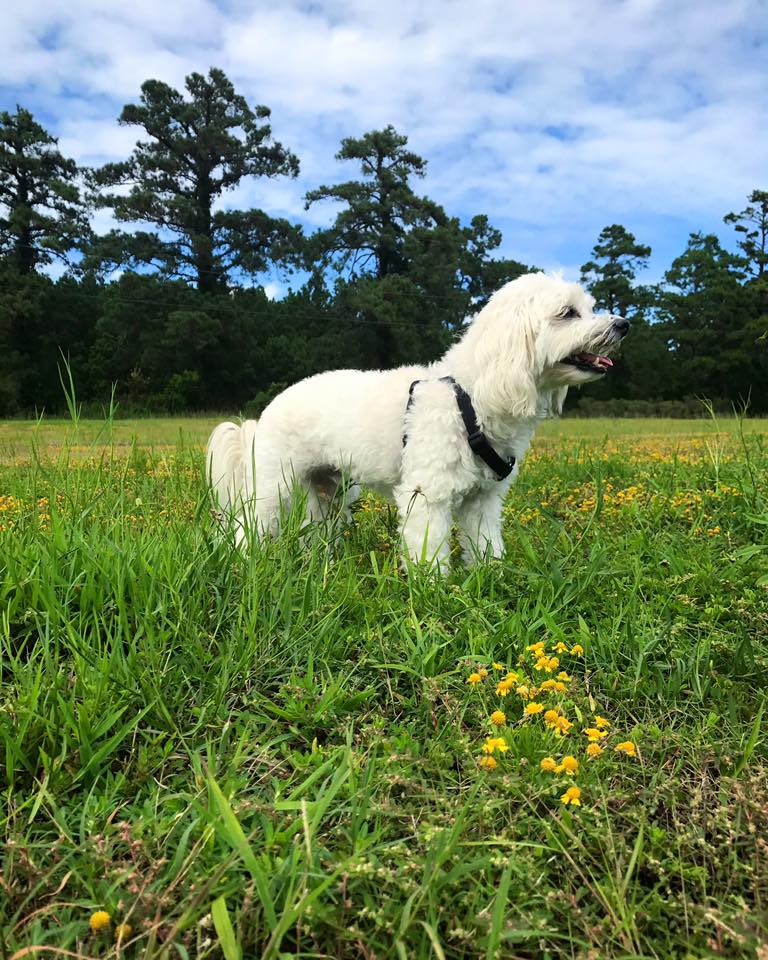Charlie’s Corner is the domain of Charlie, the furry four-legged lady’s man of Market Common. Each month, he’ll share information to help all new, visiting, and existing doggie community members get the most out of life alongside their human companions. Here, we’ll feature his reflections on what it’s like to be a dashing downtown doggie, as he reminds all of us how to play well together.
This month, Charlie gets ready to frolic, as he revels in the out-of-doors and some quaint springtime traditions.
“Springtime is officially here, which in Myrtle Beach just means that it’s nice and balmy kind of like it was last month and kind of like it will be next month too. But why not celebrate our atmospheric good fortune with a tradition that most other people probably enjoy this time of year because they can finally go out of doors and not encounter an arctic blast?
I say let’s stand with our less climactically fortunate brethren and get down and doggie with a good old-fashioned egg hunt. I’m still not sure if I eat eggs, (they just seem a little squirmy to me) and I definitely can’t eat chocolate ones, but that won’t stop me from having a good time hunting around in the grass and bushes and trees with all my friends searching for them. (One plus right now to being a dog is that I don’t have to practice social distancing.)
So why do we associate springtime with eggs and egg hunts anyhow? Well, eggs have always acted as important symbols for spring and the ensuing rebirth that occurs amongst foliage and animals— the flowers bloom, grass becomes green, bears and other animals emerge from hibernation, and new life is born. An egg, as a vessel of possibility, serves as a potent reminder of these miraculous feats of nature.
During the Middle Ages, people were forbidden to eat eggs during Lent, the Christian holiday leading up to Easter. That religious holiday marked the day that egg-eating could resume, and consequently eggs featured prominently on the menu. It was also an important form of protein for the poorer classes, who couldn’t afford meat (which was most of the population).
But it is said that the tradition of the egg hunt dates back to 16th century Germany and Martin Luther. Apparently, the fiery Protestant reformer organized egg hunts for his congregation as some sort of teaching device— kind of like a mnemonic, but with a lot more activity.
Men would hide eggs, and women would go find them— the tableau a re-enactment and reference to Jesus’ death and the discovery of his rebirth by women. I’m not sure if the history of Jesus stuck in people’s minds with greater ease for all the running around and gathering of eggs, but it’s certainly an interesting idea.
It’s also one that became more popularized by Queen Victoria of England. The queen’s mother, the Duchess of Kent, was German born, and thus familiar with the old tradition. She first organized an egg hunt at the palace when Victoria was a little girl. The eggs were boiled to cook them and make them less easy to break, and boiled in onion skins to color them a rich golden-brown hue. Yuck! Now I definitely know that I don’t eat eggs. Thank goodness at least that today we have more available color options. Not that those hot pink and aqua blue colors look any more appetizing to me. I think I’ll stick with dog treats.
But getting back to the story, egg coloring, and egg hunting trickled down to the masses, and gained in such popularity that fake eggs started being made for hunting, as well as confections in the shape of an egg. Today, egg coloring and hunting is still all the rage. I can’t wait for mine, just for the sport of it. But if you really want to see me excited, then you can send me on a dog-biscuit hunt. Now those I know I’ll eat!”
Until next time,


















